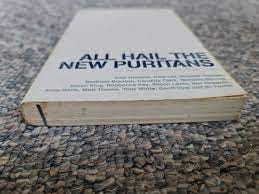Yesterday’s three manifestos were mine.
I still largely agree with them. Especially the one-liners. (No lyrical despair and Whatever it is, it must be passionately uncool.)
The Quantum Prose Manifesto I wrote at the same time I was writing Notes for a Young Gentleman, and it’s partly an anticipatory defence of that strange book.
But parts of what I wrote, I am still very much thinking through:
Novels struggle to portray simultaneity; novels can’t cope with true multiplicity; novels mimic slow, fake communities; novels are wonderful at constructing wishful worlds.
A lot of writers live with these questions:
How is it possible to write the World-Capturing Novel with Lots of Different People doing Lots of Different Things All at Once? Is it possible convincingly to write very different people to the person one mainly is? Can writers ever avoid the fictional structure of Meanwhile Over Here… and Meanwhile Over There?
The only other manifesto I can remember signing was The New Puritan Manifesto of around 2000. Also involved with this, apart from the editors Nicholas Blincoe and Matt Thorne, were Alex Garland, Scarlett Thomas, Geoff Dyer and others.
Most of what the manifesto asserts, I have been writing against ever since. Not necessarily consciously. But as a set of limits that seem to be set very much against ambition, fun and excess. Against what I want writing to be able to do.
1. Primarily story-tellers, we are dedicated to the narrative form.
I’ve tried very hard to get away from conventional story structures, yet write in forms that make the reader want to read on. (You’re reading on of these now.)
2. We are prose writers and recognise that prose is the dominant form of expression. For this reason we shun poetry and poetic licence in all its forms.
I definitely don’t shun poetic influence on prose. I think it’s one of the only viable futures, given that AI writes in a largely New Puritan manner. But it goes beyond that, to what I think a literary sentence can achieve.
3. While acknowledging the value of genre fiction, whether classical or modern, we will always move towards new openings, rupturing existing genre expectations.
If I do anything, it’s try to exist on the point where genre and rupturing co-exist. Genres are more powerful than individual writers. When you put a murder in your first chapter, you are writing a crime novel, whether you like it or not. Yet surely the most exciting thing a writer can do is found a new genre.
4. We believe in textual simplicity and vow to avoid all devices of voice: rhetoric, authorial asides.
This seems a bit silly. Even a series of declarative sentences à la Elmore Leonard are a device of rhetoric. They are making a claim of honest plainness, and trying to win the reader over by a display of verbal ergonomics. (No hunch, no backache.)
5. In the name of clarity, we recognise the importance of temporal linearity and eschew flashbacks, dual temporal narratives and foreshadowing.
This was the hardest of the rules to obey. I’d recommend any writer to try, at least once, to write without any manipulation of temporality at all. What they’ll likely learn is how flat the world they create feels.
6. We believe in grammatical purity and avoid any elaborate punctuation
Now this is puritanical. As I’ve said before, each punctuation mark has its purpose. Even if you hate semi-colons, surely you can use them to characterise the invidious writing of a hateful narrator? I wish there were more punctuation marks. Don’t deny yourself a tool just because you only rarely have need of it.
7. We recognise that published works are also historical documents. As fragments of our time, all our texts are dated and set in the present day. All products, places, artists and objects named are real.
I think this was mainly a reaction to Martin Amis naming a car a ‘Ford Fiasco’ in his novel Money. Now, even for the sake of a joke, this is pretty lame. It creates a world in which we have to imagine the design, advertising, marketing and all management departments of the Ford Motor company signing off on calling their own car rubbish. The joke works forwards but not backwards. However, Amis is at least having a go at remaking the world. Having a character drive a Ford Fiesta is realistic, and may make the point of social location, but it’s giving up on a certain important energy of reinvention.
8. As faithful representations of the present, our texts will avoid all improbable or unknowable speculation about the past or the future.
This seems to be expressing the vestiges of a philosophical hatred of idealism. It’s enforced empiricism. Yet most of us spend most of our time engaging in unknowable speculation abut the past and future. I know I do.
9. We are moralists, so all texts feature a recognisable ethical reality.
What would an unrecognisable ethical reality be? Something inhuman. If so, I would be extremely keen to read about it.
10. Nevertheless, our aim is integrity of expression, above and beyond any commitment to form.
This kiss-off, and step-back, seems a deliberate nod to the final one of George Orwell’s six rules of writing: ‘Break any of these rules sooner than say anything outright barbarous.’ In other words, don’t mistake this for utter seriousness.
The credit for the New Puritan Manifesto goes to:
(Nicholas Blincoe & Matt Thorne (eds): All Hail The New Puritans, Fourth Estate, London 2000).
At the time I signed up for the New Puritan Manifesto, and took part in writing a story for the anthology, I’d just finished my novel Corpsing, and was very aligned with the editors animus against lazy literary fiction.
Writing this now, I’m not having a go at Nicholas and Matt, just using what they once collectively said for some precise echolocation.
Here we are not.



